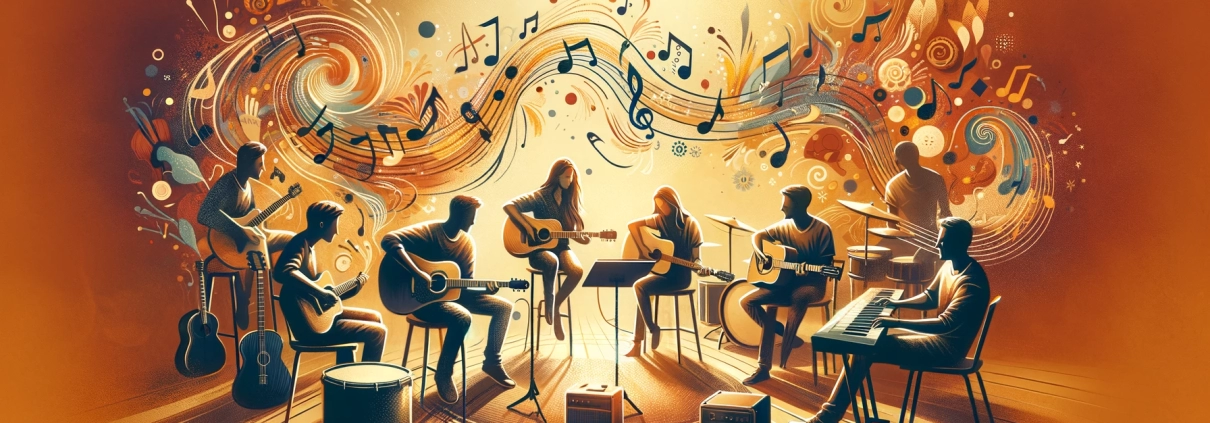Effective Tips for Collaborating with Other Musicians
Collaborating with other musicians can be one of the most rewarding experiences in your musical journey. It allows for the exchange of ideas, fosters creativity, and often leads to the creation of something truly unique and memorable. However, successful collaboration requires more than just musical talent; it demands communication, respect, and flexibility. In this blog post, we’ll explore some effective tips for collaborating with other musicians, ensuring that every joint effort is a harmonious and productive one.
Establish Clear Communication
Clear and open communication is the cornerstone of any successful collaboration. Discuss your goals, expectations, and musical direction at the outset. Be open to feedback and ready to articulate your ideas in a way that’s constructive and respectful.
Tips:
- Set Expectations: Agree on the project’s scope, deadlines, and individual contributions.
- Regular Check-ins: Schedule regular meetings or calls to stay updated on progress and address any issues.
Embrace Diversity
One of the joys of collaboration is the blending of diverse musical backgrounds and influences. Embrace the unique perspectives and skills each musician brings to the table. This diversity can lead to innovative musical solutions and a richer, more complex sound.
Tips:
- Explore Each Other’s Influences: Share playlists or albums that inspire you.
- Incorporate Different Styles: Don’t shy away from blending genres or trying out new techniques.
Define Roles and Responsibilities
To avoid confusion and overlap, define each participant’s roles and responsibilities early on. Whether it’s songwriting, arranging, or performing, knowing who is responsible for what can streamline the process and enhance productivity.
Tips:
- Delegate Tasks: Assign specific roles like lyric writing, melody creation, or production.
- Create a Plan: Outline the workflow and deadlines for each task.
Practice Active Listening
Active listening involves fully concentrating on what is being played or said, understanding the message, and responding thoughtfully. In a collaborative setting, listening to each other’s ideas and playing can inspire new directions and ensure everyone feels valued and heard.
Tips:
- Focus During Sessions: Pay full attention during rehearsals and discussions.
- Feedback Loop: Provide constructive feedback and be receptive to others’ input.
Be Open to Compromise
Not every idea will align perfectly with your vision, and that’s okay. Collaboration is about finding common ground and merging different ideas into a cohesive whole. Be willing to compromise and find solutions that satisfy all parties involved.
Tips:
- Prioritize the Project: Focus on what’s best for the project, not individual preferences.
- Flexible Mindset: Be ready to adapt and try out others’ suggestions.
Schedule Regular Rehearsals
Consistent practice and rehearsal are crucial in a collaborative effort. Regular meetings not only help refine your collective sound but also strengthen group dynamics and rapport. Use this time to experiment, adjust, and perfect your collaboration.
Tips:
- Consistent Schedule: Set a regular rehearsal time that works for everyone.
- Goal-Oriented Sessions: Have clear objectives for each rehearsal.
Use Technology to Your Advantage
In today’s digital age, geographic distance doesn’t have to be a barrier to collaboration. Utilize online platforms and collaboration tools to share ideas, record demos, and even perform together virtually.
Tips:
- Online Collaboration Tools: Use platforms like Zoom, Google Drive, or music-specific apps like Splice.
- File Sharing: Regularly update shared folders with new recordings or notes.
Celebrate Achievements and Learn from Challenges
Every collaboration will have its highs and lows. Celebrate your achievements together and view any challenges as learning opportunities. The experience gained from each collaboration is invaluable and can significantly contribute to your growth as a musician.
Tips:
- Acknowledge Milestones: Celebrate completing a song or hitting a creative breakthrough.
- Reflect Together: Discuss what worked well and what could be improved for future projects.
Conclusion
Collaborating with other musicians is an enriching experience that can push the boundaries of your creativity and technical skills. By fostering an environment of respect, openness, and communication, you can ensure that every collaboration is not just a learning opportunity but a chance to create something truly extraordinary.
Embrace the journey of musical collaboration and remember that every partnership is a chance to learn, grow, and create something beautiful together.
—
Set up a free trial lesson, available both in-person and online, by fill out this form and we’ll get back to you within 24 hours.


